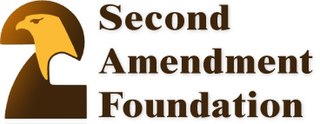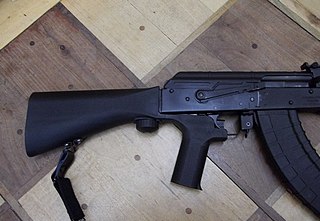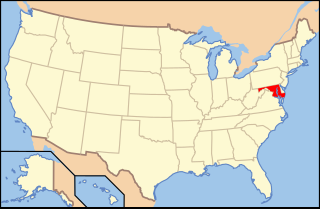Related Research Articles

The Second Amendment to the United States Constitution protects the individual right to keep and bear arms. It was ratified on December 15, 1791, along with nine other articles of the Bill of Rights. In District of Columbia v. Heller (2008), the Supreme Court affirmed for the first time that the right belongs to individuals, for self-defense in the home, while also including, as dicta, that the right is not unlimited and does not preclude the existence of certain long-standing prohibitions such as those forbidding "the possession of firearms by felons and the mentally ill" or restrictions on "the carrying of dangerous and unusual weapons". State and local governments are limited to the same extent as the federal government from infringing upon this right.
Gun politics is an area of American politics defined by two primary opposing ideologies about civilian gun ownership. People who advocate for gun control support increasing regulations related to gun ownership; people who advocate for gun rights support decreasing regulations related to gun ownership. These groups often disagree on the interpretation of laws and court cases related to firearms as well as about the effects of firearms regulation on crime and public safety. It is estimated that U.S. civilians own 393 million firearms, and that 35% to 42% of the households in the country have at least one gun. The U.S. has the highest estimated number of guns per capita, at 120.5 guns for every 100 people.
The Office of Film and Literature Classification is an independent Crown entity established under Films, Videos, and Publications Classification Act 1993.

The Second Amendment Foundation (SAF) is a United States nonprofit organization that supports gun rights. Founded in 1974 by Alan Gottlieb and headquartered in Bellevue, Washington, SAF publishes gun rights magazines and public education materials, funds conferences, provides media contacts, and has assumed a central role in sponsoring lawsuits.

Bump stocks or bump fire stocks are gun stocks that can be used to assist in bump firing. Bump firing is the act of using the recoil of a semi-automatic firearm to fire ammunition cartridges in rapid succession, but with a loss of accuracy.

In the United States, open carry refers to the practice of "openly carrying a firearm in public", as distinguished from concealed carry, where firearms cannot be seen by the casual observer. To "carry" in this context indicates that the firearm is kept readily accessible on the person, within a holster or attached to a sling. "Carrying" a firearm directly in the hands, particularly in a firing position or combat stance, is also known as "brandishing" and may constitute a serious crime, but that is not the mode of "carrying" discussed in this article.
In the United States, access to guns is controlled by law under a number of federal statutes. These laws regulate the manufacture, trade, possession, transfer, record keeping, transport, and destruction of firearms, ammunition, and firearms accessories. They are enforced by state agencies and the federal Bureau of Alcohol, Tobacco, Firearms and Explosives (ATF).
District of Columbia v. Heller, 554 U.S. 570 (2008), was a landmark decision of the US Supreme Court ruling that the Second Amendment protects an individual's right to keep and bear arms, unconnected with service in a militia, for traditionally lawful purposes, such as self-defense within the home, and that the District of Columbia's handgun ban and requirement that lawfully owned rifles and shotguns be kept "unloaded and disassembled or bound by a trigger lock" violated this guarantee. It also stated that the right to bear arms is not unlimited and that guns and gun ownership would continue to be regulated. It was the first Supreme Court case to decide whether the Second Amendment protects an individual right to keep and bear arms for self-defense or if the right was intended for state militias.
The gun laws of New Zealand are contained in the Arms Act 1983 statute, which includes multiple amendments including those that were passed subsequent to the 1990 Aramoana massacre and the 2019 Christchurch mosque shootings.
Military-style semi-automatic firearms in New Zealand are those semi-automatic firearms known in the United States as "assault weapons". The phrase is often abbreviated as military-style semi-automatic (MSSA). A New Zealand firearms licence-holder requires an E Category endorsement on their licence before they can possess this type of firearm, and a police-issued permit to procure each firearm is required. Arriving at a clear definition and common understanding of which semi-automatic firearms have a military-style configuration has dominated debate about gun-control legislation in New Zealand since 1992.

In New Zealand, the Arms Act 1983 is the primary statute controlling the possession and use of firearms and air guns.
Censorship in New Zealand has been present since around 1850 and is currently managed by the Office of Film and Literature Classification under the Films, Videos, and Publications Classification Act of 1993.
McDonald v. Chicago, 561 U.S. 742 (2010), is a landmark decision of the Supreme Court of the United States that found that the right of an individual to "keep and bear arms," as protected under the Second Amendment, is incorporated by either the Due Process Clause or Privileges or Immunities Clause of the Fourteenth Amendment and is thereby enforceable against the states. The decision cleared up the uncertainty left in the wake of District of Columbia v. Heller as to the scope of gun rights in regard to the states.

Gun laws in Maryland regulate the sale, possession, and use of firearms and ammunition in the U.S. state of Maryland.

The Sixth Labour Government has governed New Zealand since 26 October 2017. It is headed by Labour Party leader and Prime Minister Jacinda Ardern.
New York State Rifle & Pistol Association Inc. v. City of New York, New York, abbreviated NYSRPA v. NYC, was a case addressing whether the gun ownership laws of New York City, which restrict the transport of a licensed firearm out of one's home violated the Constitution's Second Amendment, Commerce Clause, and right to travel. It was the first major gun-related case that the Supreme Court had accepted for review in nearly ten years, after District of Columbia v. Heller (2008) and McDonald v. City of Chicago (2010). After the Supreme Court agreed to hear the case, New York City and New York state amended its laws to allay the challenged provision. In a per curiam decision in April 2020, the Supreme Court determined that the case was moot, vacating and remanding the case to lower courts to determine "whether petitioners may still add a claim for damages in this lawsuit with respect to New York City's old rule."

Two consecutive mass shootings occurred at mosques in a terrorist attack in Christchurch, New Zealand, during Friday Prayer on 15 March 2019. The attack, carried out by a single gunman who entered both mosques, began at the Al Noor Mosque in the suburb of Riccarton at 1:40 pm and continued at Linwood Islamic Centre at 1:52 pm. He killed 51 people and injured 40.

The Arms Amendment Act 2019 is a New Zealand bill that amends the Arms Act 1983 to ban semi-automatic firearms, magazines, and parts that can be used to assemble prohibited firearms. It was introduced by Labour Cabinet Minister and Member of Parliament Stuart Nash in response to the Christchurch mosque shootings. The Bill passed its third and final reading on 10 April 2019, receiving royal assent the following day. The Arms Amendment Bill was supported by all parties represented in Parliament except the opposition ACT Party.

The Arms Legislation Bill is an omnibus bill by the New Zealand Government that established a new regulatory regime to regulate the use and storage of firearms in New Zealand including creating a gun registry. The bill passed its first reading on 24 September 2019 with the support of the Labour–led coalition government and its coalition partners New Zealand First and the Greens but was opposed by the opposition National and ACT parties. The bill passed its second reading on 19 February 2020 and its third reading on 18 June 2020 and receiving royal assent on 24 June 2020.
References
- ↑ "Kiwi Party: Goals". Kiwi Party. Retrieved 2 July 2019.
- ↑ "Party Policies". Kiwi Party. Retrieved 2 July 2019.
- ↑ "Cannabis Referendum". Kiwi Party. 13 December 2019. Retrieved 30 April 2020.
- ↑ "2020 Broadcasting Allocation Decision Released". Electoral Commission. 29 May 2020. Retrieved 29 May 2020.
- ↑ Kiwi Party (15 April 2019). "Kiwi Party application to Secretary of Internal Affairs to review manifesto". Voxy. Retrieved 2 July 2019.
- ↑ "NZ Register of Classification Decisions". Te Mana Whakaatu / Classification Office. Retrieved 30 April 2020.
- ↑ "Legal challenge to Government gun law thrown out". New Zealand Herald. 2 July 2019. Retrieved 2 July 2019.
- ↑ S. Every-Palmer, R. Cunningham, M. Jenkins & E. Bell (2020) The Christchurch mosque shooting, the media, and subsequent gun control reform in New Zealand: a descriptive analysis, Psychiatry, Psychology and Law, DOI: 10.1080/13218719.2020.1770635
- 1 2 Hurley, Sam (26 March 2020). "Kiwis have no constitutional right to bear arms, Court of Appeal rules in failed challenge to Govt gun ban". New Zealand Herald– via www.nzherald.co.nz.
- ↑ Hurley, Sam (11 February 2020). "Supreme Court says no to Kiwi Party's 'leapfrog' appeal over legality of Government's firearms ban". New Zealand Herald. ISSN 1170-0777 . Retrieved 20 September 2020.
- ↑ "Declaratory Judgement Update April 2020". Kiwi Party. 23 April 2020. Retrieved 30 April 2020.